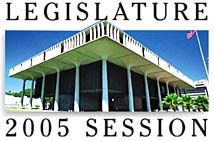Measure protects
farm lands
Critics say that the plan
doesn't go far enough to save
prime land from development
Farmers and landowners are hailing landmark legislation that sets up a process to implement a 1978 state constitutional provision designed to protect important agricultural lands.
"We believe it's a big first step in finally addressing the issue of identifying important agricultural land in the state," said Alan Takemoto, executive director of the Hawaii Farm Bureau Federation. "This is huge. Our industry has been waiting for this for over 27 years."
|
|
"The way the bill is written, it seems like it's less about agriculture and more about protecting landownership," said Rep. Hermina Morita (D, Hanalei-Waipouli), one of four state House Democrats who voted against the measure.
A 1978 state constitutional amendment called on the state to protect agricultural land by identifying "important agricultural lands."
It was an issue especially dear to former Mayor Jeremy Harris because he helped write the amendment.
But the Legislature is empowered with setting the criteria for designating those lands but has not moved on the issue for more than two decades, which frustrated Harris until the end of his term.
As one of his last actions in office, Harris called the City Council into special session during the Christmas holidays to vote on a bill to protect 84,000 acres of farm land on Oahu from urban sprawl. The Council instead sent the measure back to committee with some saying they wanted to see whether the state Legislature would act.
The issue is also important to Gov. Linda Lingle, who highlighted the issue in her 2004 State of the State address
"This is a critically important issue for us. It goes to the heart of me painting agriculture as an important part of the economy sustaining our way of life here without being dependent on outside sources of food. It also goes to the issue of land preservation, affordable housing -- they're all interconnected," Lingle said last week. "And if it's a pretty good bill, I'm going to sign it with enthusiasm."
The key to passing any legislation on the subject this year, supporters say, was getting the landowners and the farmers to compromise.
"There was a good attempt to get people together to talk about it," said Dean Uchida, executive director of the Land Use Research Foundation, a lobbying group for developers and landowners.
Things came together when the two sides could look at preserving farmland in terms of being good for business, Uchida said. "You can't have open land with weeds," Uchida said.
Under the conference committee draft of House Bill 1640, the counties would recommend which parcels to designate as important agricultural lands. They would based their decisions on criteria, including whether the land is currently being used for farming and whether the land had the right soil, water and other conditions for farming.
Each county council would have to approve the recommendations, which then go to the state Land Use Commission for final approval.
None of these designations can take place, however, until the Legislature adopts a package of incentives for landowners or farmers whose lands receive the designation -- including tax credits, grants and loans, some of which would require a government financial commitment.
But landowners can voluntarily petition the Land Use Commission to designate their land important as agricultural land at any time.
Jeff Mikulina, Sierra Club's Hawaii chapter director, said he is concerned that the designations can't take place until the incentive package is developed, which could take several more years to complete especially if the state and counties don't have the funding.
The goal was to make sure farmers and ranchers stay in business, the farm bureau's Takemoto said. The incentives will ensure that the best agricultural lands will be around for future generations, he said.
Mikulina and others are concerned that the bill puts a limit on how much land can be designated by the Land Use Commission as important agricultural land.
"The recent edition is a mockery in what the Constitution requires. The Constitution says, 'shall identify.' It doesn't say identify half of them," said Mikulina, who said that the bill that went into conference was better than the bill that came out.
"I think right now we're looking at the possibility of 50 percent of the land held by large landowners possibly escaping or avoiding simply because the landowner objects," Rep. Morita said.
Janelle Saneishi, spokeswoman for the Department of Agriculture, said the department had similar concerns but agreed overall with the bill's intent.
"The main thing about this are the standards, procedures and policy to protect ag lands," Saneishi said. "No bill comes out perfect to all parties, but I think the main things were still in there."
Sen. Russell Kokubun, chairman of the Water, Land and Agriculture Committee, said placing limits on what the state can designate was put in to help landowners feel a bit easier about moving forward with the designation process.
"This provides a comfort zone that this will not be a taking or an overextension of the authority by the government," Kokubun (D, Hilo-Naalehu) said.
"Anytime we address an issue that is very complex and contentious such as this, it's going to take time. This one bill will not resolve all of the issues that we would like to accomplish. It's too huge of a bite to take up in one session," Takemoto said.
[News] [Business] [Features] [Sports] [Editorial] [Do It Electric!]
[Classified Ads] [Search] [Subscribe] [Info] [Letter to Editor]
[Feedback]

